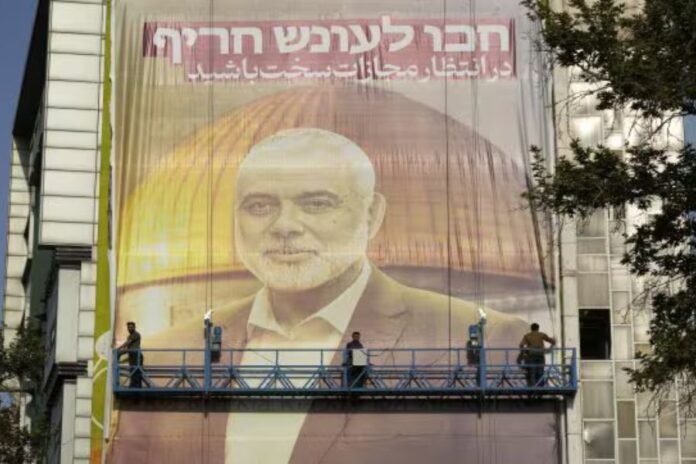Top Hamas leader Ismail Haniyeh was killed in a drone strike by Israel on Wednesday (July 31) while he was in Tehran for the swearing-in ceremony of new Iran president Masoud Pezeshkian. The incident has left the entire world in a state of shock.
While Israel has remained mute on the matter, Hamas and Iran have both accused Israel of carrying out the assassination. However, some sections of society in Israel and several government officials celebration the assassination of the Hamas chief on social media platforms.
Ayatollah Ali Khamenei, the Supreme Leader of Iran, declared that exacting revenge was “our duty” and that Israel had “prepared a harsh punishment for itself” shortly after it was revealed that Haniyeh had been killed by an “airborne projectile”.
The Revolutionary Guard of Iran has issued a warning, stating that Iran and its regional allies will respond to Israel with “harsh and painful.” An all-out conflict between Iran and its worst adversary, Israel, has been brought to light by the assassination and the discourse that followed.
We examine Iran’s potential response in more detail, as well as the implications for the stability of the region.
How did Israel kill Hamas chief Ismail Haniyeh?
Haniyeh, the leader of Hamas’s political faction, was killed early on July 31st while living in a Tehran building designated for retired Iranian military personnel.
Haniyeh and his bodyguard, later identified as Wasim Abu Shaaban, were killed after a “airborne projectile” struck the building where they were staying, according to Iranian official television.
A few hours before he was assassinated, Haniyeh was spotted embracing moderate President Masoud Pezeshkian on the parliament floor after he took the oath of office, while MPs and other officials sang chants in favor of the Palestinian cause. Haniyeh was in Tehran for the moderate President’s inauguration ceremony.
Notably, Israeli airplanes targeted Hezbollah commander Fuad Shukr by bombing a residential building in a southern Beirut suburb just hours before word of Haniyeh’s death spread. More than 70 people were injured, and at least three people—including the head of Hezbollah—were killed.
How has Iran responded?
Iran and its allies expressed their deep outrage and condemnation of Israel following Haniyeh’s killing. The country will preserve its territorial integrity and honor, according to the newly appointed Iranian President Pezeshkian, and the “terrorist occupiers will regret their cowardly action.”
The military branch of Hamas issued a warning of “enormous consequences” for the entire area. Israel “miscalculated,” the group stated in a statement, by assassinating resistance leaders and transgressing Iran’s and Lebanon’s sovereignty.
“This is a dangerous and historic moment that escalates the conflict and will have far-reaching effects on the entire region—the assassination of leader Haniyeh in the center of the Iranian capital,” the group declared.
Ayatollah Ali Khamenei, the Supreme Leader of Iran, declared that Tehran has a duty to exact revenge on Israel for providing the justification for “harsh punishment for itself” in the killing of Haniyeh. The death was also criticized by Qatar and Egypt, among other countries. In the talks for a ceasefire and the release of hostages, both have been acting as mediators.
The question of how mediation can be successful when one side assassinates the other side’s negotiator is raised by political assassinations and the ongoing targeting of civilians in Gaza while negotiations are ongoing. Sheikh Mohammed bin Abdulrahman Al Thani, the prime minister of Qatar, stated on social media.
Also Read: How India is successfully countering China in Indo-Pacific and beyond
How can Iran hit Israel?
Will the vitriol that has been generated by Haniyeh’s murder go beyond words? Experts in geopolitics predict it will.
The Supreme Leader of Iran, Ayatollah Ali Khamenei, has reportedly already “issued an order for Iran to strike Israel directly, in retaliation for the killing in Tehran of Hamas’ leader, Ismail Haniyeh,” according to the New York Times, which cited three Iranian officials, two of whom were in the Revolutionary Guards.
The directive was issued during “an emergency meeting of Iran’s Supreme National Security Council on Wednesday morning,” the article claims. This heightens the possibility of a full-scale conflict between Israel and Iran, further destabilizing the West Asian region.
Given that Hamas is a Sunni organization and Iran’s leadership is Shia, the true test for Iran will be how far it can push things. Haniyeh was not “one of its guys,” though.
Iran might respond to the Israeli airstrike on Damascus, Syria, which killed seven people in April, including Mohammad Reza Zahedi, the top Iranian commander, and his deputy. Subsequently, 300 drones and missiles were fired by Tehran at Israeli sites. Nonetheless, Israel claimed that its Iron Dome defense system stopped 99 percent of Iran’s drone and missile launches.
Analysts also point out that if the nation want to keep its reputation intact, it must respond to Iran. Furthermore, they claim that an Iranian attack would dissuade Israel from eliminating other formidable adversaries, such as Hezbollah’s leader Hassan Nasrallah or the Quds Forces’ commander General Ismail Qaani, who is in charge of the terrorist organizations.
A direct or indirect response from Iran might have catastrophic effects on the West Asian region. Despite the dire humanitarian situation and mounting international pressure to end it, experts point out that Haniyeh’s assassination and any potential response will complicate the Gaza ceasefire talks.
Nevertheless, despite everything, experts claim Iran has no interest in going to war with Israel. The director of the International Crisis Group’s Middle East program, Joost Hiltermann, told AFP that Iran will “unleash its allies only when its vital interests have been harmed, and this is not the case.”



